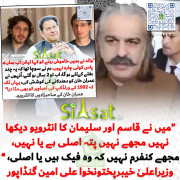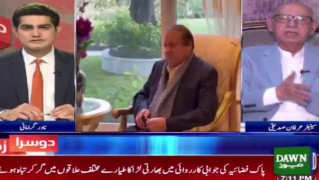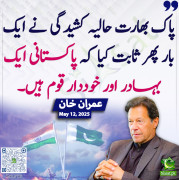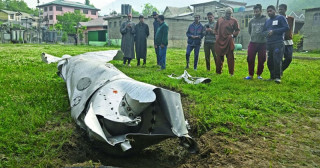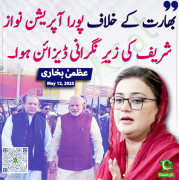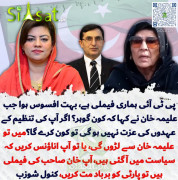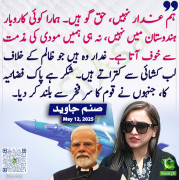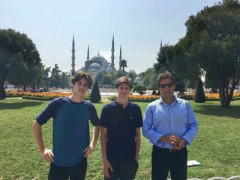You are using an out of date browser. It may not display this or other websites correctly.
You should upgrade or use an alternative browser.
You should upgrade or use an alternative browser.
SUnnat o Bidaat
- Thread starter karachiwala
- Start date
- Status
- Not open for further replies.
Pakistani1947
Chief Minister (5k+ posts)
Bid'at (innovation) is something that has no Islamic basis. A thing which is not proved from the Holy Quran and Hadith, as in practice at the time of the Holy Prophet, his companions, but is now done as religious duty.
The Prophet (saw) has condemned one who indulges in innovation and called them "destroyer of the religion". There are literally thousands of examples of Bid'at!
To build graves of hard bricks
To build domes on graves
To light candles near graves
To spread sheets and covers on graves
To gather for feast after a death in a house
Jabir b. Abdullah said: When Allah's Messenger (may peace he upon him) delivered the sermon, his eyes became red, his voice rose. and his anger increased so that he was like one giving a warning against the enemy and saying:" The enemy has made a morning attack on you and in the evening too." He would also say:" The last Hour and I have been sent like these two." and he would join his forefinger and middle finger; and would further say:" The best of the speech is embodied in the Book of Allah, and the beet of the guidance is the guidance given by Muhammad. And the most evil affairs are their innovations; and every innovation is error." He would further say:, I am more dear to a Muslim even than his self; and he who left behind property that is for his family. and he who dies under debt or leaves children (in helplessness). the responsibility (of paying his debt and bringing up his children) lies on me." (Sahih Muslim Book #004, Hadith #1885)
'Asim reported: I asked Anas b. Malik whether Allah's Messenger (may peace be upon him) had declared Medina as sacred. He said: Yes. (the area) between so and so. He who made any innovation in it, and further said to me: It is something serious to make any innovation in it (and he who does it) there is upon him the curse of Allah, and that of the angels and of all the people, Allah will not accept from him on the Day of Resurrection either obligatory acts or the surpererogatory acts. Ibn Anas said: Or he accommodates an innovator. (Sahih Muslim Book #007, Hadith #3159)
The Prophet (saw) has condemned one who indulges in innovation and called them "destroyer of the religion". There are literally thousands of examples of Bid'at!
To build graves of hard bricks
To build domes on graves
To light candles near graves
To spread sheets and covers on graves
To gather for feast after a death in a house
Jabir b. Abdullah said: When Allah's Messenger (may peace he upon him) delivered the sermon, his eyes became red, his voice rose. and his anger increased so that he was like one giving a warning against the enemy and saying:" The enemy has made a morning attack on you and in the evening too." He would also say:" The last Hour and I have been sent like these two." and he would join his forefinger and middle finger; and would further say:" The best of the speech is embodied in the Book of Allah, and the beet of the guidance is the guidance given by Muhammad. And the most evil affairs are their innovations; and every innovation is error." He would further say:, I am more dear to a Muslim even than his self; and he who left behind property that is for his family. and he who dies under debt or leaves children (in helplessness). the responsibility (of paying his debt and bringing up his children) lies on me." (Sahih Muslim Book #004, Hadith #1885)
'Asim reported: I asked Anas b. Malik whether Allah's Messenger (may peace be upon him) had declared Medina as sacred. He said: Yes. (the area) between so and so. He who made any innovation in it, and further said to me: It is something serious to make any innovation in it (and he who does it) there is upon him the curse of Allah, and that of the angels and of all the people, Allah will not accept from him on the Day of Resurrection either obligatory acts or the surpererogatory acts. Ibn Anas said: Or he accommodates an innovator. (Sahih Muslim Book #007, Hadith #3159)
Pakistani1947
Chief Minister (5k+ posts)
The innovators (بدعتی) present following is the Hadeeth in Sahih Muslim to justify their inovations (بدعت):
Anas reported: A man came panting and entered the row of worshippers and said: Praise be to Allah, much praised and blessed. When the Messenger of Allah (may peace be upon him) finished the prayer he said: Who amongst you uttered these words? The people remained silent. He (the Holy Prophet again said) -: Who amongst you uttered these words? He said nothing wrong. Then a man said: I came and had a difficulty in breathing, so I uttered them. He replied: I saw twelve angels facing one another as to who will take them up (to Allah). (Sahih Muslim Book #004, Hadith #1247)
No Muslim says that uttering these words " Praise be to Allah, much praised and blessed " is biddat (بدعت). The biddat (even Shirk) is that if somebody start uttering "Ya Ghaus ul Azam" , "Ya Ali" etc.
It is very clear from Above Hadeeth that the person was uttering the words alone inside a mosque, which is still common practice in mosques.
I have personally experienced a biddat (بدعت). Some of Muslims now a days, utter words like "Allah hoo" in groups in chorus, inside a room with all lights off and at the same time shaking their head (and body) up and down. That would be called biddat.
Furthermore, during the life of Prophet Muhammad (صلی اللہ علیہ وآلہ وسلم), he (صلی اللہ علیہ وآلہ وسلم) himself was there to correct Muslims if they were going towards wrong direction. Prophet Muhammad (صلی اللہ علیہ وآلہ وسلم) has completely delivered the religion before he (صلی اللہ علیہ وآلہ وسلم) died. After his (صلی اللہ علیہ وآلہ وسلم) death there is nobody to correct if somebody is taking a wrong path, except Quraan and Sunnah.
In the end, I would like to say that, please leave this beautifull and simple religion Islam free of pollution like URS, Milad, Tazias, qawalis etc. and follow just Quraan and Sunnah because after the death of Prophet Muhammad nobody can claim that he is capable of inventing something in religion Islam which was missed by Prophet Muhammad (صلی اللہ علیہ وآلہ وسلم) (Nauzobillah).
Anas reported: A man came panting and entered the row of worshippers and said: Praise be to Allah, much praised and blessed. When the Messenger of Allah (may peace be upon him) finished the prayer he said: Who amongst you uttered these words? The people remained silent. He (the Holy Prophet again said) -: Who amongst you uttered these words? He said nothing wrong. Then a man said: I came and had a difficulty in breathing, so I uttered them. He replied: I saw twelve angels facing one another as to who will take them up (to Allah). (Sahih Muslim Book #004, Hadith #1247)
No Muslim says that uttering these words " Praise be to Allah, much praised and blessed " is biddat (بدعت). The biddat (even Shirk) is that if somebody start uttering "Ya Ghaus ul Azam" , "Ya Ali" etc.
It is very clear from Above Hadeeth that the person was uttering the words alone inside a mosque, which is still common practice in mosques.
I have personally experienced a biddat (بدعت). Some of Muslims now a days, utter words like "Allah hoo" in groups in chorus, inside a room with all lights off and at the same time shaking their head (and body) up and down. That would be called biddat.
Furthermore, during the life of Prophet Muhammad (صلی اللہ علیہ وآلہ وسلم), he (صلی اللہ علیہ وآلہ وسلم) himself was there to correct Muslims if they were going towards wrong direction. Prophet Muhammad (صلی اللہ علیہ وآلہ وسلم) has completely delivered the religion before he (صلی اللہ علیہ وآلہ وسلم) died. After his (صلی اللہ علیہ وآلہ وسلم) death there is nobody to correct if somebody is taking a wrong path, except Quraan and Sunnah.
In the end, I would like to say that, please leave this beautifull and simple religion Islam free of pollution like URS, Milad, Tazias, qawalis etc. and follow just Quraan and Sunnah because after the death of Prophet Muhammad nobody can claim that he is capable of inventing something in religion Islam which was missed by Prophet Muhammad (صلی اللہ علیہ وآلہ وسلم) (Nauzobillah).
Pakistani1947
Chief Minister (5k+ posts)
The innovators (بدعتی) also present following is the Hadeeth from Sahih Bukhari to justify their inovations (بدعت):
Narrated Zaid bin Thabit: Abu Bakr sent for me owing to the large number of casualties in the battle of Al-Yamama, while 'Umar was sitting with him. Abu Bakr said (to me), 'Umar has come to my and said, 'A great number of Qaris of the Holy Quran were killed on the day of the battle of Al-Yamama, and I am afraid that the casualties among the Qaris of the Quran may increase on other battle-fields whereby a large part of the Quran may be lost. Therefore I consider it advisable that you (Abu Bakr) should have the Qur'an collected.' I said, 'How dare I do something which Allah's Apostle did not do?' 'Umar said, By Allah, it is something beneficial.' 'Umar kept on pressing me for that till Allah opened my chest for that for which He had opened the chest of 'Umar and I had in that matter, the same opinion as 'Umar had." Abu Bakr then said to me (Zaid), "You are a wise young man and we do not have any suspicion about you, and you used to write the Divine Inspiration for Allah's Apostle. So you should search for the fragmentary scripts of the Quran and collect it (in one Book)." Zaid further said: By Allah, if Abu Bakr had ordered me to shift a mountain among the mountains from one place to another it would not have been heavier for me than this ordering me to collect the Qur'an. Then I said (to 'Umar and Abu Bakr), "How can you do something which Allah's Apostle did not do?" Abu Bakr said, "By Allah, it is something beneficial." Zaid added: So he (Abu Bakr) kept on pressing me for that until Allah opened my chest for that for which He had opened the chests of Abu Bakr and 'Umar, and I had in that matter, the same opinion as theirs. So I started compiling the Quran by collecting it from the leafless stalks of the date-palm tree and from the pieces of leather and hides and from the stones, and from the chests of men (who had memorized the Quran). I found the last verses of Sirat-at-Tauba: ("Verily there has come unto you an Apostle (Muhammad) from amongst yourselves--' (9.128-129) ) from Khuzaima or Abi Khuzaima and I added to it the rest of the Sura. The manuscripts of the Quran remained with Abu Bakr till Allah took him unto Him. Then it remained with 'Umar till Allah took him unto Him, and then with Hafsa bint 'Umar. (Sahih Bukhari: Book #89, Hadith #301)
But if someone read above Hadith without any bias, he/she would understand that above Hadith is actually going against innovators (بدعتی) (makers of innovations in the religion Islam)!
The lesson you can get from above hadeeth that Abu Bakr (رَّضِيَ اللَّهُ عَنْهُمْ) were reluctant and careful to any thing new into the deen which was not done by Prophet Muhammad (صلی اللہ علیہ وآلہ وسلم) even though it was compilation of Qur'aan. Honestly could you image the high Calibre Sahaba Abu Bakr (رَّضِيَ اللَّهُ عَنْهُمْ), who never celebrated Milad-un-Nabi during or after the dead of Prophet Muhammad (صلی اللہ علیہ وآلہ وسلم), would had ever approve the biddat and SHIRK very common today, like URS, Qabar Parasti, Tazias, Qawalis etc.?
Also note that Abu Bakr (رَّضِيَ اللَّهُ عَنْهُمْ) was not an ordinary person, he was the first Khalifa of Muslim Umma. Hence you can not even think of saying that he (رَّضِيَ اللَّهُ عَنْهُمْ) had no decision making knowledge (Nauzobilla)
Narrated Zaid bin Thabit: Abu Bakr sent for me owing to the large number of casualties in the battle of Al-Yamama, while 'Umar was sitting with him. Abu Bakr said (to me), 'Umar has come to my and said, 'A great number of Qaris of the Holy Quran were killed on the day of the battle of Al-Yamama, and I am afraid that the casualties among the Qaris of the Quran may increase on other battle-fields whereby a large part of the Quran may be lost. Therefore I consider it advisable that you (Abu Bakr) should have the Qur'an collected.' I said, 'How dare I do something which Allah's Apostle did not do?' 'Umar said, By Allah, it is something beneficial.' 'Umar kept on pressing me for that till Allah opened my chest for that for which He had opened the chest of 'Umar and I had in that matter, the same opinion as 'Umar had." Abu Bakr then said to me (Zaid), "You are a wise young man and we do not have any suspicion about you, and you used to write the Divine Inspiration for Allah's Apostle. So you should search for the fragmentary scripts of the Quran and collect it (in one Book)." Zaid further said: By Allah, if Abu Bakr had ordered me to shift a mountain among the mountains from one place to another it would not have been heavier for me than this ordering me to collect the Qur'an. Then I said (to 'Umar and Abu Bakr), "How can you do something which Allah's Apostle did not do?" Abu Bakr said, "By Allah, it is something beneficial." Zaid added: So he (Abu Bakr) kept on pressing me for that until Allah opened my chest for that for which He had opened the chests of Abu Bakr and 'Umar, and I had in that matter, the same opinion as theirs. So I started compiling the Quran by collecting it from the leafless stalks of the date-palm tree and from the pieces of leather and hides and from the stones, and from the chests of men (who had memorized the Quran). I found the last verses of Sirat-at-Tauba: ("Verily there has come unto you an Apostle (Muhammad) from amongst yourselves--' (9.128-129) ) from Khuzaima or Abi Khuzaima and I added to it the rest of the Sura. The manuscripts of the Quran remained with Abu Bakr till Allah took him unto Him. Then it remained with 'Umar till Allah took him unto Him, and then with Hafsa bint 'Umar. (Sahih Bukhari: Book #89, Hadith #301)
But if someone read above Hadith without any bias, he/she would understand that above Hadith is actually going against innovators (بدعتی) (makers of innovations in the religion Islam)!
The lesson you can get from above hadeeth that Abu Bakr (رَّضِيَ اللَّهُ عَنْهُمْ) were reluctant and careful to any thing new into the deen which was not done by Prophet Muhammad (صلی اللہ علیہ وآلہ وسلم) even though it was compilation of Qur'aan. Honestly could you image the high Calibre Sahaba Abu Bakr (رَّضِيَ اللَّهُ عَنْهُمْ), who never celebrated Milad-un-Nabi during or after the dead of Prophet Muhammad (صلی اللہ علیہ وآلہ وسلم), would had ever approve the biddat and SHIRK very common today, like URS, Qabar Parasti, Tazias, Qawalis etc.?
Also note that Abu Bakr (رَّضِيَ اللَّهُ عَنْهُمْ) was not an ordinary person, he was the first Khalifa of Muslim Umma. Hence you can not even think of saying that he (رَّضِيَ اللَّهُ عَنْهُمْ) had no decision making knowledge (Nauzobilla)
such bolo
Chief Minister (5k+ posts)
بسم اللہ الرحمٰن الرحیم
بدعت درحقیقت اللہ کے نبی صلی اللہ علیہ وسلّم کی بہت بڑی گستاخی ہے...ت
بدعتی شخص درحقیقت دین کے عبادتی امور میں نئی نئی چیزیں ایجاد کرتا ہے اور یہ پیغام دیتا ہے کے اللہ کے نبی صلی اللہ علیہ وسلّم کا دین ناقص تھا اور دین میں کچھ مزید چیزوں کی کمی تھی جو ہم/بدعتیوں نے پوری کردی جس کا علم اللہ کے نبی صلی اللہ علیہ وسلّم کو نہیں تھا...وہ یہ بھی باور کرواتا ہے کے کہ کچھ مزید اعمال بھی ہیں جن سے اللہ خوش ہوسکتا ہے اور آپ صلی اللہ علیہ وسلّم نے ہمیں انکی خبر نہیں دی...نعوذباللہ میں ذالک
اللہ دین کو خالص رکھنے والوں کو اجر عظیم عطا فرماے اور دین میں ملاوٹ کرکے اللہ کے نبی صلی علیہ وسلّم کے دین کی شکل بگڑنے والوں کو ہدایت دے...ت
بدعتی شخص درحقیقت دین کے عبادتی امور میں نئی نئی چیزیں ایجاد کرتا ہے اور یہ پیغام دیتا ہے کے اللہ کے نبی صلی اللہ علیہ وسلّم کا دین ناقص تھا اور دین میں کچھ مزید چیزوں کی کمی تھی جو ہم/بدعتیوں نے پوری کردی جس کا علم اللہ کے نبی صلی اللہ علیہ وسلّم کو نہیں تھا...وہ یہ بھی باور کرواتا ہے کے کہ کچھ مزید اعمال بھی ہیں جن سے اللہ خوش ہوسکتا ہے اور آپ صلی اللہ علیہ وسلّم نے ہمیں انکی خبر نہیں دی...نعوذباللہ میں ذالک
اللہ دین کو خالص رکھنے والوں کو اجر عظیم عطا فرماے اور دین میں ملاوٹ کرکے اللہ کے نبی صلی علیہ وسلّم کے دین کی شکل بگڑنے والوں کو ہدایت دے...ت
Last edited:
Salfi Party is on...Muslims stay away from it.
shia baba jee is in. plz be carefull.
such bolo
Chief Minister (5k+ posts)
کچھ لوگ صحابہ رضوان اللہ اجمعین پر الزام لگاتے ہیں کے انہوں نے بدعت ایجاد کی جب کے یہ انتہائی سنگین الزام ہے کوئی صحابی سوچ بھی نہیں سکتا تھا کے کوئی ایسا عمل کرے جو اللہ کے نبی صلی اللہ علیہ وسلّم نے تو نہ کیا ہو اور وہ اپنی مرضی سے کوئی نیا عمل کرے اور اسے ثواب سمجھتے ہووے لوگوں میں عام کرے اور دین سازی کرے
ہاں انہوں نے اللہ کے نبی صلی اللہ علیہ وسلّم کے ان اعمال کو دوبارہ زندہ کیا جن پر عمل مفقود ہوچکا تھا یا اللہ کہ نبی صلی اللہ علیہ
وسلّم نے خود اپنی حیاتی تک نہ کرنے یا اجتماعی انداز میں نہ کرنے کا حکم دیا تھا تاکہ فرضیت کے زمرے میں نہ چلا جائے
اس کی مثال حضرت عمر رضی اللہ عنہ کی تراویح کو دوبارہ اس انداز میں زندہ کرنے کی ہے جس انداز میں اللہ کے نبی صلی اللہ علیہ وسلّم نے خود پڑھائی تھی اور اس عمل کے دوبارہ زندہ ہونے پر حضرت عمر رضی اللہ عنہ نے لفظ "بدعت" استعمال کیا تھا
یہاں حضرت عمر نے بدعت کا لفظ لغوی اعتبار سے استعمال کیا تھا نہ کہ شرعی اصطلاحی معنوں میں...کیوں کہ شرعی اصطلاحی معنوں میں تو بدعت ایک مذموم اور مردود چیز ہے اور مذموم اور مردود چیز کا "حسنہ" یا "اچھی" ہونے کا سوال ہی پیدا نہیں ہوتا
جیسے کے "کفر" اور"شرک" مذموم اور مردود ہیں اور انکے لئے "کفر حسنہ" یا "شرک حسنہ" کے الفاظ نہ ممکن ہیں لیکن چوں کے کفر کے لغوی معنیٰ انکار کے ہیں اس لئے اگر کوئی شخص کہے کے میں طاغوت کا کفر کرتا ہوں یعنی انکار کرتا ہوں تو اس کا یہ جملہ کفر کے لغوی معنوں کے اعتبار سے قابل تسلیم ہے اسی طرح حضرت عمر رضی اللہ عنہ کا یہ کہنا کے کتنی اچھی بدعت ہے بھی اسی قبیل سے ہے
امید ہے بات واضح ہوچکی ہوگی انشاءللہ ...وما علینا الالبلاغ
ہاں انہوں نے اللہ کے نبی صلی اللہ علیہ وسلّم کے ان اعمال کو دوبارہ زندہ کیا جن پر عمل مفقود ہوچکا تھا یا اللہ کہ نبی صلی اللہ علیہ
وسلّم نے خود اپنی حیاتی تک نہ کرنے یا اجتماعی انداز میں نہ کرنے کا حکم دیا تھا تاکہ فرضیت کے زمرے میں نہ چلا جائے
اس کی مثال حضرت عمر رضی اللہ عنہ کی تراویح کو دوبارہ اس انداز میں زندہ کرنے کی ہے جس انداز میں اللہ کے نبی صلی اللہ علیہ وسلّم نے خود پڑھائی تھی اور اس عمل کے دوبارہ زندہ ہونے پر حضرت عمر رضی اللہ عنہ نے لفظ "بدعت" استعمال کیا تھا
یہاں حضرت عمر نے بدعت کا لفظ لغوی اعتبار سے استعمال کیا تھا نہ کہ شرعی اصطلاحی معنوں میں...کیوں کہ شرعی اصطلاحی معنوں میں تو بدعت ایک مذموم اور مردود چیز ہے اور مذموم اور مردود چیز کا "حسنہ" یا "اچھی" ہونے کا سوال ہی پیدا نہیں ہوتا
جیسے کے "کفر" اور"شرک" مذموم اور مردود ہیں اور انکے لئے "کفر حسنہ" یا "شرک حسنہ" کے الفاظ نہ ممکن ہیں لیکن چوں کے کفر کے لغوی معنیٰ انکار کے ہیں اس لئے اگر کوئی شخص کہے کے میں طاغوت کا کفر کرتا ہوں یعنی انکار کرتا ہوں تو اس کا یہ جملہ کفر کے لغوی معنوں کے اعتبار سے قابل تسلیم ہے اسی طرح حضرت عمر رضی اللہ عنہ کا یہ کہنا کے کتنی اچھی بدعت ہے بھی اسی قبیل سے ہے
امید ہے بات واضح ہوچکی ہوگی انشاءللہ ...وما علینا الالبلاغ
Last edited:
Thread Closed, Please discuss this in the Group forum.
http://www.siasat.pk/forum/group.php
http://www.siasat.pk/forum/group.php
- Status
- Not open for further replies.
-
-
-
-
کنول شوزب علیمہ خان کے خلاف میدان میں
20 | خبریں -
Imran Khan's sons break their silence
27 | FORUM
-
-
-
کنول شوزب علیمہ خان کے خلاف میدان میں
20 | خبریں
© Copyrights 2008 - 2025 Siasat.pk - All Rights Reserved. Privacy Policy | Disclaimer|






